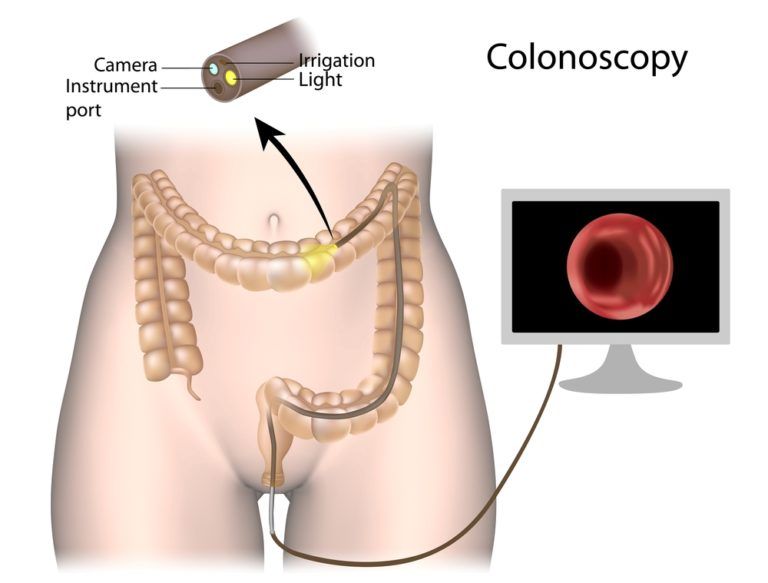Screening vs Diagnostic Colonoscopy: What’s The Difference?

Perhaps the first time you heard the terms “screening colonoscopy” and “diagnostic colonoscopy” was when you called your insurance company to ask about your coverage.
You were probably told a screening colonoscopy was covered 100%, while a diagnostic colonoscopy had a copay or coinsurance.
Understanding the difference between them can make life a little easier – and help you know what to expect for your out-of-pocket costs.
What’s The Difference?
Screening colonoscopies and diagnostic colonoscopies are performed similarly using the same equipment. The difference is how the procedure is billed to your insurance. Billing will depend on your symptoms (or lack of symptoms) and what your doctor finds during the procedure.
A colonoscopy is considered preventive screening if the patient doesn’t have any gastrointestinal symptoms and no polyps or masses are found during the colonoscopy.
The Affordable Care Act (ACA) considers preventive services “essential health benefits” and requires insurance companies to pay all associated costs. That also means you won’t have to pay a copay or coinsurance for a screening colonoscopy.
Since a diagnostic colonoscopy isn’t considered preventive, your insurance may require you to pay a copay or coinsurance.
Screening Colonoscopy
A screening colonoscopy is a preventive procedure to examine the colon to ensure it’s healthy. All adults 45 and older need screening because colon cancer is one of the most common and deadly cancers. It is also typically treatable when it’s caught early. Better yet, colon cancer can be prevented by finding and removing polyps before they can develop into cancer.
According to the American Cancer Society, people with an average risk of developing colon cancer should have a screening colonoscopy every ten years.
A colonoscopy is considered screening when:
- You are between the ages of 45-75
- You’ve had no lower gastrointestinal signs or symptoms before the colonoscopy
- You’ve received a positive stool-based test (Cologuard) and require a follow-up colonoscopy
- No polyps or masses are found during the colonoscopy
- There’s no family history of polyps or colon cancer
- You have no history of polyps or colon cancer
- An individual is at high risk of colorectal cancer (including those under the age of 45) due to-
- A close relative (sibling, parent, child) has had colon cancer or an adenomatous polyp
- A family history of familial adenomatous polyp
- A personal history of adenomatous polyps; or
- A personal history of colorectal cancer, or
- Inflammatory bowel disease, including Crohn’s Disease, and ulcerative colitis.
Diagnostic Colonoscopy
Unlike a screening colonoscopy, you may be required to pay a deductible or coinsurance for a diagnostic colonoscopy, according to your insurance policy.
A colonoscopy is considered diagnostic when you’ve had:
- Signs or symptoms in the lower gastrointestinal tract noted in your medical record before the procedure, including:
- Abdominal pain that doesn’t improve
- Anemia
- Change in bowel habits
- Constipation
- Diarrhea
- Rectal bleeding
- Blood in the stool
Can Screening Become Diagnostic?
It’s true that you may go in for a screening colonoscopy and come out with a diagnostic colonoscopy. If your doctor finds a mass needing biopsy or finds a polyp, your colonoscopy is considered diagnostic at that point. That’s why it’s essential to understand your insurance coverage before your procedure.
What You Need to Know About Insurance Coverage for Colonoscopies
Medicare and most private insurance companies fully cover screening colonoscopies, including the deductible or coinsurance. Medicare coverage is often slightly different than private insurance plans.
Medicare Coverage
Medicare covers a screening colonoscopy:
- Every 10 years, if you’re not high risk
- Every 2 years, if you’re high risk, or have:
- A history of polyps or colon cancer
- A family history of polyps or colon cancer
- A personal history of inflammatory bowel disease (IBD), which includes ulcerative colitis and Crohn’s Disease
Medicare covers a diagnostic colonoscopy without a deductible, but you will be required to pay 20% coinsurance.
Private Insurance Coverage
Private insurance coverage for diagnostic colonoscopies varies. Always ask your insurance company about out-of-pocket costs, including copays, coinsurance, deductibles, limits, or exclusions.
Knowing whether or not a colonoscopy is considered a screening or diagnostic is not always simple. It’s important to call your insurance provider before your colonoscopy appointment to have the best idea of what your out-of-pocket cost will be.
Don’t delay your colonoscopy if you are 45 or older – schedule an appointment today! Call our office @ 907-745-8100.


